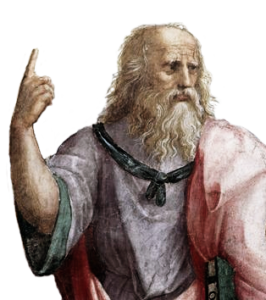Hegel über Platon 001

Parte de:
Lecciones de Historia de la Filosofía [Vorlesungen über die Geschichte der Philosophie] / Primera parte: La Filosofía Griega [Erster Teil: Griechische Philosophie] / Sección Primera: de Tales a Aristóteles [Erster Abschnitt. Von Thales bis Aristoteles] / Capítulo 3: Platón y Aristóteles [Drittes Kapitel: Platon und Aristoteles] / A. Platón [A. Philosophie des Platon]

ĒRVDĪTIŌRIBVS ***
Tabla de contenidos
Vorlesungen im Atrium Philosophicum §1
A. Philosophie des Platon
[Einleitung]
Dies ist Ausbildung zur Wissenschaft, und näher des sokratischen Standpunkts zur Wissenschaftlichkeit. Mit Platon fängt die philosophische Wissenschaft als Wissenschaft an.
Platon gehört auch zu den Sokratikern. Er ist der berühmteste der Freunde und Zuhörer des Sokrates, und der das Prinzip des Sokrates, daß das Wesen im Bewußtsein, Wesen des Bewußtseins ist, in seiner Wahrheit auffaßte: daß das Absolute im Gedanken und alle Realität der Gedanke ist, – nicht der einseitige Gedanke oder in dem Sinne des schlechten Idealismus, nach welchem der Gedanke wieder auf eine Seite tritt und sich als bewußter Gedanke faßt und der Realität gegenüberstellt, sondern der Gedanke, der in einer Einheit ebensowohl Realität als Denken ist, der Begriff und seine Realität in der Bewegung der Wissenschaft, – Idee eines wissenschaftlichen Ganzen. Das Recht des selbstbewußten Denkens, das Sokrates zum Prinzip erhoben hatte, dies bloß abstrakte Recht erweiterte Platon zum Gebiete der Wissenschaft. Er verließ den engen Gesichtspunkt, in welchem Sokrates den an und für sich seienden Gedanken aufgefaßt hatte, nämlich als Wesen und Zweck für den selbstbewußten Willen, und erfaßte denselben als das Wesen des Universums. Er hat dem Prinzip Ausdehnung gegeben und die Weise der Konstruierung, Ableitung des Prinzips, wenn seine Darstellung auch nicht wissenschaftlich ist.
Praelēctiōnēs in Ātriō Philosophicō §1
A. La Filosofía de Platón
[Introducción]
La ciencia filosófica empieza a desarrollarse como tal y el punto de vista socrático empieza a adquirir rasgos de cientificidad a partir de Platón, y la trayectoria que éste inicia llega a su remate con Aristóteles. Nadie tiene más derecho que estos dos pensadores a llamarse maestros del género humano.
Platón tiene también su puesto entre los filósofos socráticos; es el más famoso de los amigos y oyentes de Sócrates y concibió en toda su verdad el principio de su maestro según el cual la esencia reside en la conciencia, ya que de acuerdo con él lo absoluto ha de buscarse en el pensamiento y toda realidad es pensamiento: no el pensamiento unilateral o el pensamiento concebido en el sentido del idealismo malo, según el cual el pensamiento reaparece en uno de los lados, se concibe como pensamiento consciente y se enfrenta a la realidad, sino el pensamiento que abarca en una unidad tanto la realidad como el pensar, el concepto y su realidad en el movimiento de la ciencia, y la idea de un todo científico. Así, pues, mientras que Sócrates sólo concebía el pensamiento que es en y para sí como fin para la voluntad consciente de sí misma, Platón abandona este estrecho punto de vista y amplía el derecho puramente abstracto del pensamiento consciente de sí mismo, que Sócrates elevara a principio, llevándolo al terreno de la ciencia; con lo cual hace posible una construcción y una derivación a base del principio, aunque su exposición no tenga todavía carácter científico.
Perge ad initium paginae huius
Lectures at the Atrium Philosophicum §1
A. Plato’s Philosophy
[Introduction]
This is just training for science, and closer to the Socratic standpoint for scientificity. Philosophical science as science begins with Plato.
Plato is also one of the Socratics. He is the most famous of Socrates’ friends and listeners, and he understood the truth of Socrates’ principle that the essence in consciousness is the essence of consciousness: that the absolute in thought and all reality is thought – not the one-sided thought or in the sense of bad idealism, according to which thought again takes a side and grasps itself as conscious thought and opposes reality, but the thought which in a unity is as much reality as thought, the concept and its reality in the movement of science – the idea of a scientific whole. The right of self-conscious thought, which Socrates had raised to a principle, this merely abstract right Plato expanded to the area of science. He left the narrow point of view in which Socrates had conceived thought as existing in and for itself, namely as the essence and purpose of the self-conscious will, and conceived it as the essence of the universe. He gave the principle extension and the manner of constructing and deriving the principle, even if his presentation is not scientific.
